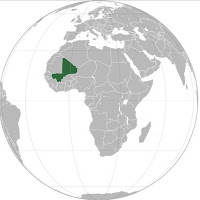El Salvador supplies peacekeeping forces in Mali
It used to be that a mention of United Nations peacekeepers in conjunction with El Salvador was a reference to the UN Observers Mission (ONUSAL) which was on the ground in El Salvador in the first few years after El Salvador's civil war ended in 1992. Today, however, El Salvador is sending out peacekeepers of its own to different parts of the globe. It happens without much notice, but for three years El Salvador has been sending military units to participate in UN peacekeeping efforts in Africa.
From Dialogo, the Digital Military Magazine this week:
This role in peacekeeping for El Salvador has been supported by the US. From the US State Department:
 |
| Location of Mali |
From Dialogo, the Digital Military Magazine this week:
United Nations (UN) delegates screened the equipment and flight technology the Salvadoran Air Force’s (FAS, in Spanish) Gavilán I Air Contingent will use as it joins the United Nations Multidimensional Integrated Stabilization Mission in Mali (MINUSMA, in French) in September 2018....
The Gavilán I contingent will consist of pilots and specialists in communication, maintenance, and weaponry. “This is the third air contingent FAS deploys in MINUSMA; it will work simultaneously with the Torogoz IV contingent and the Airfield Ground Services Unit,” Salvadoran Minister of Defense David Munguía Payés said during the UN experts’ visit. “Their mission will be to provide air and land escort, and air fire support when required. We contribute to international security and peace by supporting transition authorities.”The Salvadoran helicopter contingent first arrived in Mali in 2015. According to this article, the choppers operated by the Salvadoran air force have played an important role:
Nicknamed the Little Bird or Killer Egg, the fast and nimble MD500 series of helicopters has long proven its worth as a scout and light attack platform. Amid limited resources, a small team from El Salvador has been using the chopper's capabilities to fly armed patrols, provide overwatch for forces on the ground, and even evacuate casualties in support of United Nations mission in the West African country of Mali, which has become one of the most deadly peacekeeping efforts in the world.El Salvador also has the only female helicopter pilot, Sandra Hernandez, in the UN mission in Mali.
This role in peacekeeping for El Salvador has been supported by the US. From the US State Department:
El Salvador stands as a leader and role model to many other countries seeking to step up to the challenge of international peacekeeping. In 2015, after sending troops to peacekeeping missions with other countries, El Salvador achieved a major peacekeeping milestone in 2015 when it made its first independent contribution to the UN peacekeeping mission to the United Nations Multidimensional Integrated Stabilization Mission in Mali (MINUSMA). Each step of the way, the U.S. Department of State’s Global Peace Operations Initiative (GPOI) has supported El Salvador’s efforts by working with the U.S. Department of Defense to deliver training, equipment, and related support.The State Department puts in context El Salvador's recent role in peacekeeping:
El Salvador started small, deploying its personnel embedded with other countries in order to gain peacekeeping experience. El Salvador partnered with Spain’s military in Lebanon, and teamed up with Chile for peacekeeping duties in Haiti. Today, El Salvador is a peacekeeping contributor in its own right, and currently has more than 100 peacekeepers deployed to the MINUSMA, a UN peacekeeping mission of 13,000 personnel from over 50 countries established in 2013 to support the political process and to help stabilize Mali.MINUSMA is the largest current peacekeeping operation of the United Nations. The mandate of the mission in Mali is very broad and includes such as ensuring security, stabilization and protection of civilians; supporting national political dialogue and reconciliation; and assisting the reestablishment of State authority, the rebuilding of the security sector, and the promotion and protection of human rights in that country. So far 173 peacekeepers have lost their lives in operations there. This Globe and Mail article offers a good overview of the turbulent situation in Mali.
Comments